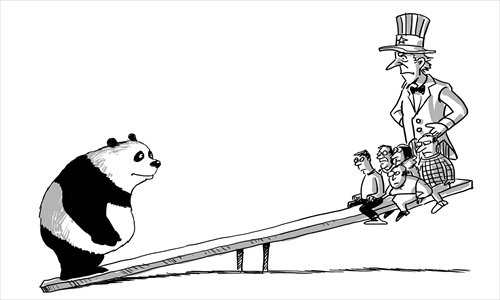HOME >> OP-ED
Rebalance prompts suspicion from cautious Asian countries
By Su Xiaohui Source:Global Times Published: 2013-10-29 19:28:02

Illustration: Liu Rui/GT
In October, US President Barack Obama cancelled his trip to Southeast Asia due to the federal government shutdown. It has aroused disappointment and dissatisfaction from regional countries. Moreover, the efficiency and sustainability of the US "pivot to Asia" is being questioned.
Yet it is untrue to say that the US influence in Asia has diminished. First and foremost, the US military presence has obviously increased.
The country has realized a de facto permanent military presence in some regional countries such as Australia, by utilizing the rotating force agreements. It has secured the access to sites with strategic importance, including Subic Bay, Cam Ranh Bay, and so on.
Meantime, the drills headed by the US in the Asia-Pacific region reached an unprecedented level in frequency and scale in 2012.
Under US leadership, the negotiations over the Trans-Pacific Partnership have made rapid progress, even though there is concern that the talks may not be able to meet the December target.
And while the US strengthened its traditional alliances with Japan, South Korea and Philippines, it has also tightened its ties with other regional countries such as India and Vietnam.
The US sensed that the term "pivot to Asia" might cause some concern from regional countries especially China. Accordingly, it has chosen the word "rebalance" to replace the previous term.
At the same time, it has tried to develop the strategy into a comprehensive one, which not only focuses on security but also takes into account economic cooperation and development.
However, the adjustments are not sufficient to resolve the structural obstacles in such rebalance.
Fundamentally, the goal of "pivot to Asia" or "rebalancing" is to maintain the US leadership in the Asia-Pacific region. But neither Southeast Asian countries nor China are in favor of a leading US role.
Southeast Asia is looking forward to opportunities for economic development and regional security. They expect the US to contribute rather than control. Therefore, it will be difficult for the regional countries to sacrifice their own interests to assist US policies.
China has reaffirmed that it will not seek leadership but instead support ASEAN playing a leading role in regional development. China doesn't believe that it is appropriate for an extra-territorial power to be the boss of the region.
The US has tried to assure China of the policy intentions of the rebalance. Nonetheless, since it is seeking to reshape the order in the region, this will inevitably involve "regulation" of China.
This has had a negative impact on China-US relationship. The two countries have reached an agreement that they will work toward a new type of relationship between major powers, which means that they need to find a better way to avoid unnecessary confrontation.
However, some people are still trumpeting Obama's inefficiency in corralling China's "theft of US intellectual property" or curbing China's "currency manipulation."
Some analysts also argue that the US should avoid shaking the confidence of allies who depend on the US to check China's "more coercive tendencies." They see China as the dragon in the region to be defeated.
The US should realize that most Southeast Asian countries have a more balanced judgment on China's role in the region than US hawks do. It is along with their interests to balance between China and the US. They are reluctant to take sides. Only certain countries try to gain an advantageous position in dealing with China by utilizing the US support.
The US should fundamentally change the policy design of the pivot to Asia and return to practical ways to engage with the region. Otherwise, the country will fall into a predicament in which it faces not only regional revolt but also domestic accusations.
The author is deputy director of Department of International and Strategic Studies, China Institute of International Studies. opinion@globaltimes.com.cn
Posted in: Viewpoint